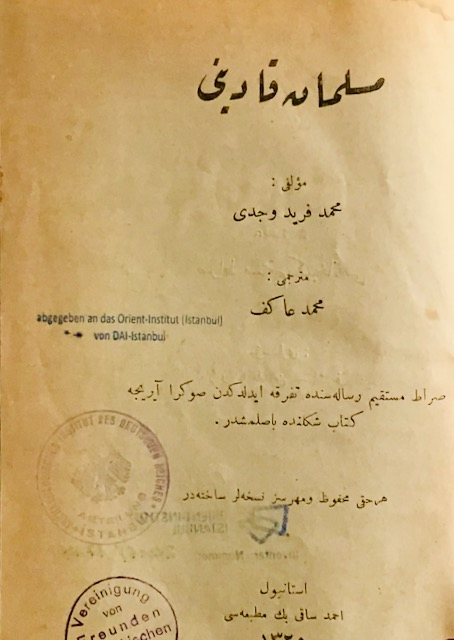
Title page of the book version of Akif’s translation of Muslim Woman (held at the library of Orient-Institut Istanbul).
Muslim Woman: The Translatability of a Patriarchal Order
Authors: A. Ebru Akcasu and Maha Abdelmegeed
9 October 2020
The research carried out over the course of June 2018 – January 2019, conducted with one of us being based at the Orient-Institut Istanbul, and the other at the American University in Beirut, contributed to an article we have been working on for the past few years. Forthcoming in a 2021 volume on translations in circulation in the nineteenth-century eastern Mediterranean and Arabian Sea (eds. Marilyn Booth and Claire Savina), our work examines the translation from Arabic into Ottoman Turkish of Al-Mar’ah al-Muslima (Muslim Woman): a 1901 response to Qasim Amin’s ‘Emancipation of Women’ that was written by the Cairo-based Muhammed Farid Wajdi (1878-1954). Wajdi’s work was translated into several languages and disseminated across a wide geography, from the Balkans to the Indian subcontinent, and beyond—in fact, Muslim Woman is still in print and remains in circulation.
Our article looks at Wajdi’s original text alongside its Ottoman Turkish translation by Istanbul-based poet and author of the Turkish Republic’s national anthem, Mehmed Akif (1873-1936). Akif’s translation, Müslüman Kadını, was serialized in the pages of the Sırat-ı Müstakim (Straight Path, 1908-1925) in the immediate aftermath of the 1908 Ottoman Constitutional Revolution before being compiled in book form for further dissemination. Our work compares and highlights the socio-political and linguistic features of Muslim Woman in the Arabic and Ottoman Turkish versions. We look, for example, at the values embedded in words like “hijab” and the deeper significance of Akif’s subtle interjections as translator. By this means, we establish ways in which Muslim Woman addresses an ongoing struggle over conceptualizing the social by relying on reader associations (and anxieties) “the woman question” had already established in this domain.
Literature:
Marilyn Booth, ed., Migrating Texts: Circulating Translations around the Ottoman Mediterranean (Edinburgh: Edinburgh University Press, 2019)
Muhammad Farid Wajdi, Al-Mar’a al-Muslima (Cairo: Matba’at al-Taraqī, 1901)
Muhammed Farid Wajdi, Müslüman Kadını, trans. Mehmed Akif (Istanbul: Ahmed Saki Bey Matbaası, 1325 [1909/10])
Ebru Akcasu (PhD SOAS, 2017) is a historian of the Ottoman Empire, with a focus on the social, legal, and political history of the late nineteenth through the early twentieth centuries. She is currently Assistant Professor at Charles University, Prague, and was a visiting researcher at the Orient-Institut Istanbul from June 2018 until January 2019.
Maha Abdelmegeed (PhD SOAS, 2017) is her co-author for a forthcoming article they were working on during Ebru Akcasu’s time at the Orient-Institut, she is an assistant professor of Arabic literature at the American University of Beirut, focusing on conceptions of the literary in Arabic during the long nineteenth century.
Citation: Akcasu, Ebru. “Muslim Woman: The Translatability of a Patriarchal Order,” Orient-Institut Istanbul Blog, 9 October 2020, https://www.oiist.org/muslim-woman-the…atriarchal-order/
Keywords
Islamicate world; Ottoman Empire; Cairo; Istanbul; 19th-20th century; gender; research project; literature; publication; OII-History & Life Narratives
